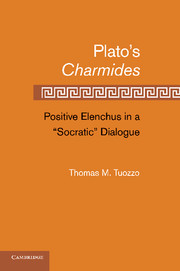Description
Plato’s Charmides
Positive Elenchus in a 'Socratic' Dialogue
Author: Tuozzo Thomas M.
Argues that Plato's Charmides presents a unitary but incomplete argument intended to lead its readers to substantive philosophical insights.
Language: English
Subject for Plato’s Charmides:
Approximative price 66.26 €
In Print (Delivery period: 14 days).
Add to cart
Plato's Charmides
Publication date: 03-2014
Support: Print on demand
Publication date: 03-2014
Support: Print on demand
Approximative price 107.93 €
In Print (Delivery period: 14 days).
Add to cart
Platoâs charmides : positive elenchus in a 'socratic' dialogue
Publication date: 09-2011
372 p. · 16.3x23.5 cm · Hardback
Publication date: 09-2011
372 p. · 16.3x23.5 cm · Hardback
Description
/li>Contents
/li>Biography
/li>
This book argues that Plato's Charmides presents a unitary but incomplete argument intended to lead its readers to substantive philosophical insights. Through careful, contextually sensitive analysis of Plato's arguments concerning the virtue of sophrosyne, Thomas M. Tuozzo brings the dialogue's lines of inquiry together, carrying Plato's argument forward to a substantive conclusion. This innovative reading of Charmides reverses misconceptions about the dialogue that stemmed from an impoverished conception of Socratic elenchus and unquestioned acceptance of ancient historiography's demonization of Critias. It views Socratic argument as a tool intended to move its addressee to substantive philosophical insights. It also argues, on the basis of recent historical research, a review of the fragments of Critias' oeuvre and Plato's use of Critias in other dialogues, that Plato had a nuanced, generally positive view of Critias. Throughout, readers are alerted to textual difficulties whose proper resolution is crucial to understanding Plato's often abstract arguments.
Part I. Approaching the Dialogue: 1. Methodological preliminaries; 2. Historical and cultural context; Part II. Approaching the Argument: 3. The opening scene; 4. Dialectic in the Charmides; Part III. The Dialectical Investigation: 5. Sophrosyne and its value; 6. Sophrosyne as self-knowledge: two reformulations; 7. Possibility of self-knowledge: Critian formulation; 8. Possibility of self-knowledge: Socratic formulation; 9. Return of the value question; 10. Socrates' final speech and closing scene; 11. Sophrosyne, knowledge, and the good.
Thomas M. Tuozzo is a Professor of Philosophy at the University of Kansas. He holds a PhD in Classics and Philosophy from Yale University, and his articles have been published in journals including the Journal of the History of Philosophy, Phronesis, Apeiron and Phoenix.
© 2024 LAVOISIER S.A.S.
These books may interest you

Plato's Philebus (RLE: Plato) 264.58 €



